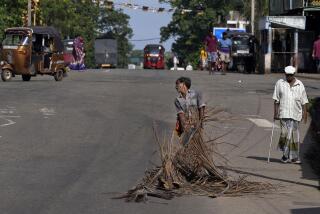Indonesia Facing Economic Meltdown, Experts Warn
- Share via
SYDNEY, Australia — Indonesia faces severely worsening economic problems in the next six months that could include more than 100% annual inflation, 25% unemployment and as much as a 30% contraction in economic output, according to new U.S. and Asian assessments.
The U.S. government assessment predicts that serious problems with starvation and severe malnutrition could appear within the next two months. An Asian expert said the new estimates represent an economic “blowout.”
“The Indonesians are in a world of hurt,” a senior U.S. official said.
The figures are significant and dangerous increases. Recent estimates from international financial institutions had forecast a 10% to 15% contraction in economic output.
Despite recent improvement in the value of the rupiah, Indonesia’s currency, the potential start of meaningful recovery is at least a year to 18 months away because it hinges on political reform, a senior Asian envoy said.
“Until you get a political dispensation that is broadly acceptable, including elections and a new constitution, you can’t restore the kind of international investor confidence that is pivotal to economic recovery,” he explained.
Full recovery may be five years or more away, Asian economists predict.
“No nation has been hit harder by the [Asian] financial crisis than Indonesia, traditionally a source of stability and growth within the region,” Secretary of State Madeleine Albright said here Thursday.
The United States announced Thursday that it will give 550,000 tons of wheat worth $62.5 million to Indonesia, as part of a $300-million U.S. pledge made at an international donors conference in Paris. Donors at the session vowed to provide $7.9 billion in new disbursements to Indonesia by March 31, 1999.
Indonesia’s decline already contrasts starkly with the country’s recent history of fairly constant economic growth, which ran an average of 7% annually for 25 years before 1997, according to Australian figures. Per capita income rose from $75 in 1966 to almost $1,200 in 1996. And the number of people living in poverty declined from 60% in 1967 to 11% in 1997.
In contrast, per capita income this year is expected to drop to $610, Asian economists predict. At least 100 million people--about half of Indonesia’s population--already live below the poverty line, Albright said Thursday in an interview with the Australian Broadcasting Co.
After decades of importing rice, Indonesia achieved self-sufficiency in 1984. But today, about 20% of its people face difficulties feeding themselves, according to Australian figures.
The crop in 1997, which coincided with the onset of economic decline, was poor. The current crop looks better, but there are several pockets where not enough food has grown, largely because of drought, and other areas where distribution has broken down.
“Some areas won’t have enough food this year; other areas could experience famine,” said the Asian envoy, who requested anonymity.
Two critical and interrelated factors could delay recovery, U.S., Asian, and Australian analysts say. The first is political reform after the resignation of longtime President Suharto in May and his replacement by B. J. Habibie.
“The real story is that at the same time the Indonesians have these awful economic problems and no real way of addressing them quickly, they also are in the process of trying to engineer political reform,” the envoy said. “To do those at the same time is bloody difficult any place in world.
“Can they get away with it? Who knows?” the envoy asked. “Because the two processes are linked, the longer it takes to complete political reform, the harder it will be to turn the economy around. In the meantime, there’s going to be further economic decline and dislocation as they work through this.”
Habibie has promised parliamentary elections by May and presidential elections by December 1999. Most of the opposition has agreed to the date for parliamentary elections. But some have complained that the date for a presidential election is too far off.
The second factor centers on Indonesia’s tiny but economically vital ethnic Chinese community, which controls as much as 70% of the country’s corporate wealth, according to Australian and Asian economists.
Since mobs in the world’s most populous Muslim nation went on a rampage of looting, arson and violence against ethnic Chinese in the spring, as much as $85 billion in business capital has fled the country, Asian and Australian officials estimate.
“We’re concerned about the outflow of capital from Indonesia in the past few months,” said Innes Willox, spokesmen for Australian Foreign Minister Alexander Downer. “We believe the Indonesian government has to regain the confidence of those people to allow them to bring their capital back into Indonesia. Without regaining that confidence, it will be extremely difficult for the Indonesian authorities to successfully refloat their economy.”
That process involves more than elections. At minimum, say Australian and Asian officials, Habibie must pledge full government protection for the Chinese and their interests.
More to Read
Sign up for Essential California
The most important California stories and recommendations in your inbox every morning.
You may occasionally receive promotional content from the Los Angeles Times.













